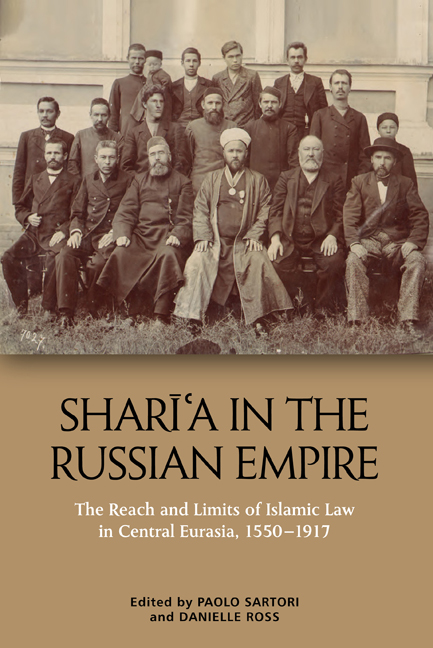Book contents
- Frontmatter
- Contents
- List of Contributors
- Introduction: The Reach and Limits of Sharīʿa in the Russian Empire, c.1552–1917
- 1 Islamic Education for All: Technological Change, Popular Literacy and the Transformation of the Volga-Ural Madrasa, 1650s–1910s
- 2 Taqlīd and Discontinuity: The Transformation of Islamic Legal Authority in the Volga-Ural Region
- 3 Debunking the ‘Unfortunate Girl’ Paradigm: Volga-Ural Muslim Women’s Knowledge Culture and its Transformation across the Long Nineteenth Century
- 4 Between Imperial Law and Islamic Law: Muslim Subjects and the Legality of Remarriage in Nineteenth-century Russia
- 5 Islamic Scholars among the Kereys of Northern Kazakhstan, 1680–1850
- 6 Tinkering with Codification in the Kazakh Steppe: ʿĀdat and Sharīʿa in the Work of Efim Osmolovskii
- 7 Taqlīd and Ijtihād over the Centuries: The Debates on Islamic Legal Theory in Daghestan, 1700s–1920s
- 8 Kunta Ḥājjī and the Stolen Horse
- 9 What We Talk about When We Talk about Taqlīd in Russian Central Asia
- 10 Take Me to Khiva: Sharīʿa as Governance in the Oasis of Khorezm (Nineteenth Century–Early Twentieth)
- Index
9 - What We Talk about When We Talk about Taqlīd in Russian Central Asia
Published online by Cambridge University Press: 22 September 2020
- Frontmatter
- Contents
- List of Contributors
- Introduction: The Reach and Limits of Sharīʿa in the Russian Empire, c.1552–1917
- 1 Islamic Education for All: Technological Change, Popular Literacy and the Transformation of the Volga-Ural Madrasa, 1650s–1910s
- 2 Taqlīd and Discontinuity: The Transformation of Islamic Legal Authority in the Volga-Ural Region
- 3 Debunking the ‘Unfortunate Girl’ Paradigm: Volga-Ural Muslim Women’s Knowledge Culture and its Transformation across the Long Nineteenth Century
- 4 Between Imperial Law and Islamic Law: Muslim Subjects and the Legality of Remarriage in Nineteenth-century Russia
- 5 Islamic Scholars among the Kereys of Northern Kazakhstan, 1680–1850
- 6 Tinkering with Codification in the Kazakh Steppe: ʿĀdat and Sharīʿa in the Work of Efim Osmolovskii
- 7 Taqlīd and Ijtihād over the Centuries: The Debates on Islamic Legal Theory in Daghestan, 1700s–1920s
- 8 Kunta Ḥājjī and the Stolen Horse
- 9 What We Talk about When We Talk about Taqlīd in Russian Central Asia
- 10 Take Me to Khiva: Sharīʿa as Governance in the Oasis of Khorezm (Nineteenth Century–Early Twentieth)
- Index
Summary
Introduction
A half-century or more in which colonialism has been examined both in imperial history and Islamic studies has produced a colossal amount of scholarship. But it has also yielded a host of assumptions and narratives about colonial sharīʿa, which are seriously in need of problematising and refining. One such narrative propounds that in the nineteenth century sharīʿa underwent a process of transformation that ultimately led to what many observers have called a ‘rupture’. Such a process is usually interpreted as the outcome of modernisation, that is, some kind of inevitable evolution in which the West imposed its legal episteme consisting of a new codification ethos, superimposed institutional rearrangements and imported secular normative sensibilities. In other words, we are dealing here with a narrative of irreversible decline according to which sharīʿa fell apart and its broken pieces could not be glued back together.
Indeed, it does not take a great effort to very real changes in the Islamic juridical field under colonial rule. One notes, for instance, the following: (i) It is today common knowledge, for example, that Western empires that extended their power over Muslim-majority regions claimed an exclusive prerogative over punitive institutions and punishments, thereby truncating qāḍīs’ jurisdiction and constraining this latter to the so-called personal status law, itself a colonial legal category. ii) One notes the institutional arrangement common to many a colonial situation whereby Muslim legists were organised into a juridical hierarchy and made subject to judicial review, either by their Muslim peers or their colonial masters. Such arrangements affected the moral standing of qāḍīs and other members of the ʿulamāʾ whose rulings became easier to quash on grounds of judicial malpractice, either actual or purported. (iii) Many have noted that the codification of sharīʿa by means of translation and massive publication of a narrow selection of juristic sources had lasting effects that rigidified the very understanding of Islamic law and overhauled its basic governing principles. (iv) One can detect changes at the semantic level: we are put in mind of the transformation of agrarian systems from a regime of usufruct to one of ownership, that is, from status to contract. Another major transformation in the field of Islamic law, which was ushered in by colonisation, is the possibility to free up property that once belonged to waqf assets.
- Type
- Chapter
- Information
- Shari'a in the Russian EmpireThe Reach and Limits of Islamic Law in Central Eurasia, 1550-1917, pp. 299 - 327Publisher: Edinburgh University PressPrint publication year: 2020



